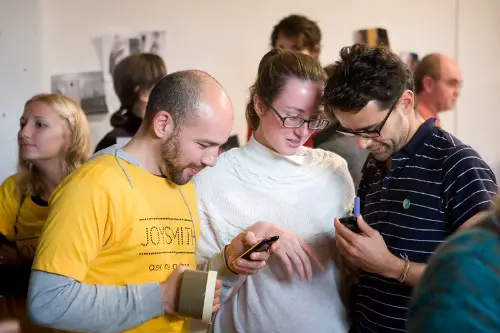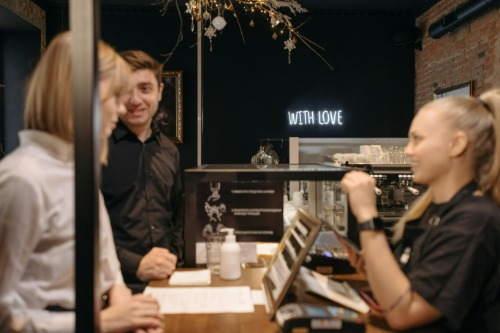1. Oversharing Personal Information Quickly

Americans tend to get comfortable with new people fast, often revealing things about their lives right away. It’s part of a culture that values authenticity and connection through shared experiences. Someone might tell a near-stranger about a recent breakup or medical issue in casual conversation. The intention is to be relatable, not overwhelming.
However, in many cultures, personal boundaries are more formal, and sharing is built on trust over time. When Americans jump into heavy or intimate topics, it can feel jarring. It may even come across as inappropriate or emotionally needy. What’s seen as friendly openness in the U.S. can feel invasive elsewhere.
2. Asking “How Are You?” Without Wanting the Real Answer

This common greeting in the U.S. is more of a ritual than a genuine question. Most of the time, the expected answer is a quick “Good, thanks!” regardless of how you’re actually feeling. Americans use it to acknowledge someone’s presence and keep things moving. But people from other countries might take it literally and feel confused when no one listens to the real response.
In places like Germany or the Netherlands, if someone asks how you are, they usually want a real answer. So when Americans ask and then immediately move on, it can seem superficial. It’s not that Americans don’t care—they’re just conditioned to treat it as a social nicety. Still, for those unaccustomed, it feels like mixed messaging.
3. Smiling at Strangers

In many parts of the U.S., smiling at people you pass on the street is considered polite and friendly. It’s seen as a small gesture of goodwill, even if you don’t know the person. Americans often associate a quick smile with approachability and openness. But in other cultures, smiling for no reason can come off as insincere or even suspicious.
In places like Russia or Japan, for example, smiling at strangers might make people wonder what you want from them. There’s a cultural expectation that smiles are earned, not automatic. So when Americans flash a grin in passing, it can feel performative or forced. It’s meant to be nice, but it doesn’t always land that way.
4. Constant Use of First Names

In the U.S., using someone’s first name—regardless of age or status—is a common sign of friendliness. Americans often see it as a way to break down social barriers and treat everyone as equals. Even children often call teachers or adults by their first names in some settings. It’s meant to foster a sense of informality and comfort.
But in other parts of the world, titles and surnames carry significant respect. Calling someone by their first name without permission might seem presumptuous or disrespectful. In places like Korea or France, honorifics are crucial to polite interaction. So when Americans skip them, it can feel overly casual or even rude.
5. Talking to Service Workers Like Old Friends

Many Americans will chat with their barista, hairstylist, or cashier as if they’ve known them for years. They’ll ask about their day, joke around, or even tell a short story while waiting for coffee. It’s an attempt to be personable and show appreciation. There’s a cultural value placed on treating everyone, regardless of role, with warmth.
But in countries where interactions are expected to be more transactional, this can feel forced or uncomfortable. People may not want personal attention while doing their jobs. They might see such behavior as unnecessary or even intrusive. What Americans think of as kindness can sometimes feel like oversharing.
6. Inviting Acquaintances Over Right Away

Americans often extend invitations to their home early in a new friendship. Hosting is considered a generous and friendly gesture. If someone says, “Come over for a barbecue!” they often mean it, even if they met you yesterday. It’s a way to connect through food, conversation, and shared space.
However, many cultures view the home as a private, almost sacred place. Inviting someone over is a big step that usually follows a well-established relationship. For some, being asked into someone’s home too early feels premature and even awkward. The warmth is appreciated, but the timing can be confusing.
7. Excessive Use of Compliments

In American culture, compliments are given freely and often. Someone might praise your shoes, your accent, or your energy within minutes of meeting. It’s considered a great way to break the ice and make people feel good. There’s a cultural script that encourages positivity and affirmation.
But in some countries, compliments are rare and more meaningful when they do occur. Getting too many compliments can feel shallow or disingenuous. People may question the speaker’s motives or sincerity. What’s normal in the U.S. can come off as flattery overload elsewhere.
8. Making Small Talk with Strangers

Chatting with strangers in line or on public transit is totally normal in many American cities. People will comment on the weather, sports, or even your groceries. It’s meant to build brief, pleasant connections in everyday life. Americans often see silence as awkward and try to fill it with conversation.
In other cultures, silence in public is not just acceptable—it’s expected. Talking to strangers can be seen as disruptive or invasive. Especially in crowded cities, people value personal space and privacy. So what Americans consider sociable may feel like boundary-crossing.
9. Using “Friend” for People They Just Met

Americans often use the word “friend” loosely, sometimes even after one pleasant interaction. You might hear someone say, “I have a friend from Spain!” when they really mean they met someone at a party once. It reflects a culture of inclusivity and optimism in relationships. There’s a desire to find common ground quickly.
However, in many places, “friend” is a more serious term reserved for meaningful, long-term connections. Using it too casually can feel misleading or confusing. People might wonder if the relationship is really that close. Americans may think they’re being warm, but it can come across as a stretch.
10. Over-Apologizing for Everything

Saying “sorry” for minor things is a deeply ingrained habit in the U.S. People will apologize for bumping into someone, for asking a question, or even for existing in a tight space. It’s a reflex that comes from wanting to be courteous and non-confrontational. Americans often equate saying sorry with being polite.
But in some cultures, apologies are reserved for serious offenses or mistakes. Using them too often can make someone seem unsure of themselves or overly self-effacing. It may even dilute the meaning of a true apology. What feels like friendliness in the U.S. can feel like unnecessary guilt elsewhere.
11. Talking Loudly in Public

Americans are often perceived as loud, especially in group settings like restaurants or public transportation. It’s usually not meant to be obnoxious—just enthusiastic or confident. Many are used to expressing themselves in full voice, without worrying too much about volume. It’s part of a culture that values openness and presence.
In quieter cultures, this behavior can be overwhelming. Speaking loudly in public may be viewed as disruptive or disrespectful. It might come off as a lack of self-awareness or consideration. Americans may not notice it, but others often do.
12. Calling Everyone “Buddy” or “Dude”

Casual nicknames like “buddy,” “dude,” or even “pal” are tossed around easily in American speech. They’re often meant to signal friendliness and put people at ease. It’s a linguistic habit that bridges gaps between strangers and builds camaraderie. You might hear it in customer service, on the street, or at a bar.
But not everyone interprets these terms positively. In some cultures, they might sound patronizing or overly familiar. Titles and formal names are more commonly expected in new interactions. Americans may be aiming for charm, but it doesn’t always translate.
13. Ending Conversations with “We Should Hang Out!”

It’s very common for Americans to wrap up a nice conversation with a line like “Let’s hang out sometime!” or “We should grab coffee!” even if they don’t mean it literally. This kind of statement is often more about expressing goodwill than setting an actual plan. It’s a socially accepted way to end on a warm note. There’s no pressure to follow up.
However, people from more direct cultures may take these words at face value. They might expect a real invitation or feel disappointed when nothing comes of it. The casual tone can seem flaky or even deceptive. Americans might see it as friendly, but others can find it confusing.
14. Saying “I Love You” Too Casually

In the U.S., “I love you” isn’t always reserved for deep, romantic partners. Friends, family members, and even pets hear it regularly. The phrase is often used to express general affection or gratitude. Saying it doesn’t necessarily imply strong emotional intensity.
But in many cultures, “I love you” carries heavy emotional weight. Using it casually can feel inappropriate or emotionally intense. Some people may feel uncomfortable or unsure how to respond. What sounds sweet in the U.S. might sound overly intimate somewhere else.
15. Giving Unsolicited Encouragement

Americans often offer enthusiastic encouragement to strangers, even in mundane situations. From “You got this!” to “You’re doing great!”—these cheerleader-like pep talks are seen as uplifting and supportive. The goal is to create a positive atmosphere and help others feel noticed. It’s a cultural reflex rooted in optimism and affirmation.
But in many places, unsolicited comments—no matter how nice—can feel intrusive or patronizing. People may wonder why a stranger is watching them or feel pressure to respond. Not everyone is comfortable being the focus of encouragement from someone they don’t know. What feels like motivational kindness in the U.S. can feel oddly performative elsewhere.
16. Offering Hugs as a Greeting

Hugging as a way to say hello or goodbye is common in the U.S., even between casual acquaintances. It’s often seen as a warm and genuine way to connect. In many regions, a quick embrace replaces a handshake once familiarity is established. For Americans, it’s a physical expression of friendliness.
However, physical contact norms vary widely across cultures. In some places, touching someone—especially early in a relationship—is considered too forward or inappropriate. A surprise hug can feel like a breach of personal space rather than a welcome gesture. Americans may think they’re showing affection, but others might just feel awkward.
17. Telling Strangers They “Look Great”

Complimenting a stranger’s outfit, hairstyle, or smile is a routine part of small talk in the U.S. These drive-by compliments are meant to brighten someone’s day and create good vibes. Americans often see this behavior as kind, harmless, and generous. It’s another form of casual connection.
But in some cultures, commenting on someone’s appearance without knowing them can feel invasive. It may be interpreted as flirtatious, presumptuous, or even insincere. People might wonder about the compliment-giver’s intentions. What Americans see as a boost of positivity can seem off-putting or inappropriate elsewhere.
18. Offering Help Without Being Asked

Many Americans will jump in to assist—whether it’s opening a door, offering directions, or helping lift something heavy. The gesture is meant to be thoughtful and proactive. It comes from a culture that encourages kindness through action. Being helpful is seen as a social responsibility.
In some cultures, though, unsolicited help can be embarrassing or even insulting. It may suggest that the person can’t handle the situation themselves. Others might find it invasive when someone assumes help is needed. Americans mean well, but it can feel like overstepping.
19. Constantly Saying “Have a Nice Day!”

You’ll hear it from cashiers, baristas, coworkers, and strangers on the street—“Have a nice day!” is practically background noise in American daily life. It’s a polite sendoff that signals friendliness and goodwill. Even when the interaction is brief, Americans often end it on a positive note. It’s part of a broader culture of customer service and casual warmth.
But in some places, this kind of cheerful farewell can feel forced or fake. People may prefer a more neutral goodbye that doesn’t overpromise. It can seem overly cheerful in situations that don’t warrant it. What Americans see as a friendly gesture can sound robotic or excessive to others.
20. Sharing Food with New Acquaintances

In the U.S., offering bites of your meal or snacks to someone you’ve just met is often seen as generous and bonding. It’s especially common at potlucks, picnics, or casual gatherings. Americans may say “You’ve gotta try this!” and hand over a fork. The gesture is meant to build rapport through shared enjoyment.
But in many cultures, food-sharing is reserved for close friends or family. Offering your plate to someone new can feel overly familiar or even unsanitary. Some people have dietary restrictions or cultural taboos that make such gestures awkward. Americans think they’re being hospitable—but it can feel like too much, too soon.
21. Overusing Friendly Exclamations

Americans love enthusiastic reactions like “Awesome!”, “Love that!”, or “Oh my gosh, stop it!” even in casual conversations. These over-the-top expressions are meant to convey excitement and engagement. The exaggerated language helps maintain a cheerful, high-energy vibe. It’s part of being expressive and approachable.
But to people from more reserved cultures, these exclamations can sound fake or exhausting. They may struggle to tell what’s genuine and what’s just filler. It can also come across as emotionally intense for a simple chat. Americans may be trying to show interest, but others might find it overwhelming.
22. Laughing to Lighten the Mood

Americans often use laughter as a social lubricant—even when nothing’s particularly funny. They’ll chuckle during small talk, laugh off awkward silences, or smile through tough topics. It’s a way to signal friendliness, ease tension, and make others feel comfortable. This habit reflects a broader cultural preference for lightness and positivity.
But in some cultures, constant laughter—especially during serious or formal moments—can seem inappropriate or unprofessional. It might make others feel that you’re not taking things seriously. People may interpret it as nervousness, insincerity, or even disrespect. Americans think they’re keeping things light, but others may feel confused or uncomfortable.
This post 22 Things Americans Do to Be Friendly That Actually Weird People Out was first published on American Charm.


